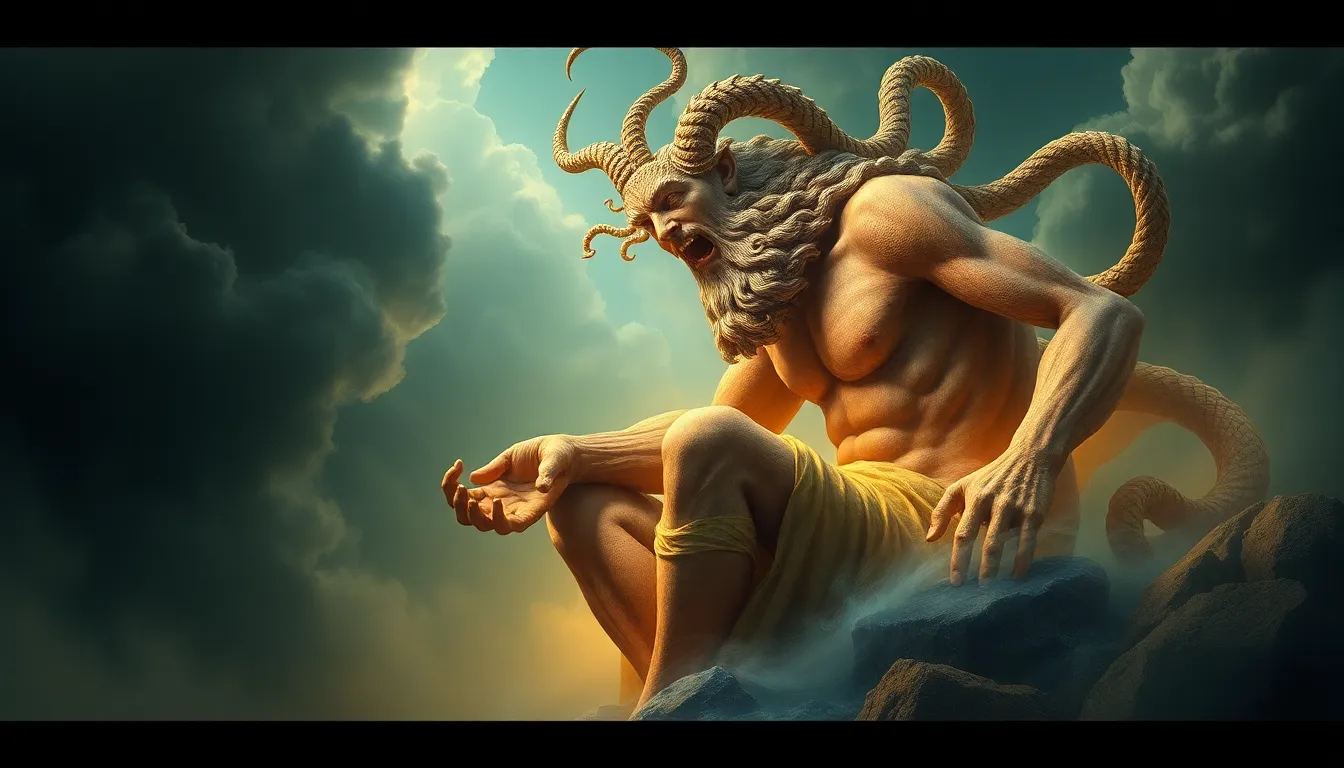The Myth of Cronus: Fatherhood Redefined in Greek Mythology
I. Introduction
In Greek mythology, Cronus stands out as one of the most complex figures, embodying the theme of fatherhood in both its nurturing and destructive aspects. As the leader of the Titans, Cronus’s narrative intertwines with themes of power, prophecy, and the cyclical nature of time and authority. The significance of fatherhood in these mythological tales often reflects societal values and individual struggles, making it a rich area for exploration. In this article, we will delve into the intricate dynamics of Cronus as a father figure, examining how his actions redefine the essence of fatherhood in Greek mythology.
II. The Origins of Cronus
Cronus, known as the youngest of the Titans, was born to Uranus (the sky) and Gaia (the earth). His lineage is crucial in understanding his character and motivations within the mythos. The Titans, a powerful race of deities, represented various natural and cosmic forces, each playing a crucial role in the ancient world’s functioning.
As Cronus grew, he became increasingly aware of a prophecy that foretold his downfall at the hands of one of his children. This fear of losing power set the stage for the tragic events that would unfold in his life and the lives of his offspring.
III. Cronus as a Father: The Prophecy and Its Consequences
The prophecy that haunted Cronus was a dire warning: he would be overthrown by one of his own children. This foreboding revelation compelled him to take drastic measures to secure his dominance. In a shocking display of paranoia and control, Cronus made the heart-wrenching decision to swallow each of his children at birth, believing that this would prevent the prophecy from coming true.
- His children included Hestia, Demeter, Hera, Hades, and Poseidon.
- Only Zeus, his youngest child, escaped this gruesome fate.
This act of swallowing his offspring not only symbolizes Cronus’s desperate attempt to maintain control but also reveals the tragic implications of his actions on family dynamics. His fear and jealousy ultimately led him to sever the bonds of love and trust with his children, portraying a distorted image of fatherhood.
IV. The Symbolism of Cronus’s Actions
The act of swallowing his children serves as a powerful metaphor for control, fear, and the destructive nature of power. Cronus’s actions encapsulate a range of themes:
- Power: Cronus embodies the fear of losing authority, leading him to extreme measures.
- Jealousy: His jealousy of the potential strength of his children drives his violent acts.
- Insecurity: Cronus’s insecurity as a ruler reflects a deeper fear of inadequacy.
These themes resonate with cultural attitudes towards fatherhood, illustrating how fear and control often overshadow love and nurturing. The myth of Cronus challenges the idealized image of fatherhood, presenting a more complex and darker portrayal.
V. The Rebellion of Zeus and the Fall of Cronus
The turning point in Cronus’s story comes when Zeus, having been saved by his mother Rhea, leads a rebellion against his father. Zeus’s rescue of his siblings marks a significant act of defiance against Cronus’s tyranny. With the aid of the Cyclopes and Hecatoncheires, Zeus and his siblings wage war against the Titans, culminating in a fierce battle known as the Titanomachy.
This conflict not only represents the struggle between generations but also highlights the role of fate and destiny in Greek mythology. Despite Cronus’s attempts to control his fate by consuming his children, he ultimately succumbs to the very prophecy he sought to evade.
VI. Cronus in Later Interpretations
In modern interpretations of the myth, Cronus’s legacy has been reshaped to explore deeper themes of fatherhood and authority. Contemporary retellings often depict him as a cautionary figure, illustrating the dangers of authoritarianism and the consequences of fear-driven decisions. The evolution of fatherhood in these narratives reflects changing societal values, emphasizing the importance of nurturing and emotional connections over control.
In literature and art, Cronus is portrayed not just as a tyrant but as a tragic figure, evoking sympathy for his lost potential as a father. This re-examination invites audiences to reflect on the complexities of parental relationships and the impact of one’s choices on family dynamics.
VII. The Broader Impact of Cronus on Greek Mythology
Cronus’s story resonates with connections to other father figures in Greek mythology, such as Uranus and Zeus. Each figure presents unique challenges and relationships that reflect varying aspects of authority and rebellion:
- Uranus: The father of the Titans, whose own downfall at the hands of Cronus sets the stage for the cycle of conflict.
- Zeus: The son who rebels against his father, representing the triumph of new ideals over outdated authority.
These relationships illustrate the ongoing themes of authority, rebellion, and the complexities of familial bonds in Greek mythology. Through the lens of Cronus, we gain insight into societal values and the evolving perceptions of fatherhood, highlighting the intricate dynamics that shape human relationships.
VIII. Conclusion
In conclusion, Cronus’s role as a father is multifaceted and deeply complex. His actions, driven by fear and a desire for control, redefine the essence of fatherhood within Greek mythology. The lasting relevance of this myth encourages us to examine our understanding of fatherhood, reflecting on the balance between authority and nurturing.
The myth of Cronus ultimately serves as a poignant reminder of the potential consequences of unchecked power and the importance of fostering healthy relationships within families. As we explore the narrative of Cronus, we uncover valuable insights into the nature of fatherhood, making it a timeless story that continues to resonate in contemporary discussions about parenting and authority.




